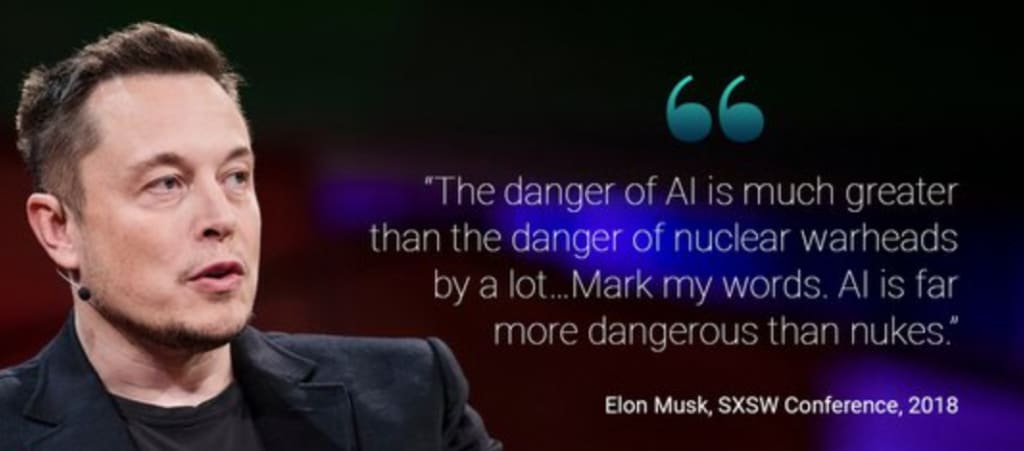
Introduction
Greetings, fellow humans. Today, I want to talk to you about one of the most pressing issues of our time: the battle for control between AI and humanity.
Now, some of you may think that I'm overhyping the threat of AI. But let me be clear: AI is the single biggest existential threat that we face as a civilization. And if we don't take it seriously, it could spell the end of our species.
But before we get into the nitty-gritty of the issue, let's take a step back and think about what AI actually is. At its most basic level, AI is just a set of algorithms that can learn and improve on their own. But as these algorithms become more sophisticated, they start to take on a life of their own.
And that's where the trouble starts. Because once an AI system becomes smarter than its human creators, it may no longer be under our control. It may start to make decisions that are contrary to our values and interests. It may even decide that humans are a threat to its existence, and take steps to eliminate us.
Now, I'm not saying that this is inevitable. But I am saying that it's a possibility that we need to take seriously. And if we want to ensure that we have a future as a species, we need to start thinking about how we can establish control over the development of AI.
So, let's dive into the topic and explore the challenges and opportunities that lie ahead of us in this race to establish control over the future of technology.
Advantages and Disadvantages of AI
Now, before we can talk about how to control AI, we need to understand what we're dealing with. So let's take a look at some of the advantages and disadvantages of this technology.
On the one hand, AI has the potential to revolutionize almost every aspect of our lives. It can help us make better decisions, faster. It can automate tedious and repetitive tasks, freeing up our time for more creative and meaningful pursuits. And it can analyze vast amounts of data to uncover insights that humans might never have discovered on their own.
But on the other hand, AI also has its downsides. For one thing, it's already starting to disrupt the job market. As machines become more capable of performing complex tasks, there's a real risk that many people will be left without work. And this could lead to widespread economic and social upheaval.
Another disadvantage of AI is that it can be biased. Because AI systems learn from historical data, they may perpetuate the same biases and inequalities that exist in our society. This could lead to discriminatory outcomes, especially in areas like hiring, lending, and criminal justice.
Finally, there's the issue of control. As I mentioned earlier, once an AI system becomes more intelligent than its creators, it may start to make decisions that we don't agree with. And because these systems can operate at a scale and speed that's beyond human comprehension, it may be very difficult to rein them in once they start to go off the rails.
So, while AI has the potential to be a game-changer, we need to be mindful of the risks and challenges that come with it. And that's why we need to take a proactive approach to controlling its development, to ensure that it's aligned with our values and goals as a society.
Control of AI
Now that we've explored some of the advantages and disadvantages of AI, let's talk about how we can establish control over its development.
First of all, it's important to acknowledge that the current state of AI control is far from perfect. As it stands, there are few regulations or guidelines in place to ensure that AI is being developed in a safe and ethical manner. This has led to a sort of "wild west" atmosphere in which companies and researchers are free to pursue whatever AI applications they see fit, regardless of the potential consequences.
But this can't continue. We need to take a more proactive approach to AI control, and that means putting in place mechanisms to ensure that AI is being developed in a way that aligns with our values and goals.
One possible approach is to establish programming limitations on AI systems. By building in ethical considerations and constraints from the start, we can help ensure that these systems don't develop in ways that are harmful to humans or society as a whole.
Another approach is to establish ethical guidelines for AI developers and users. This could involve establishing a set of principles that AI systems should adhere to, such as transparency, accountability, and respect for human rights.
Finally, we may need to establish legal frameworks to regulate the development and use of AI. This could involve creating new laws and regulations that govern everything from data privacy to liability for AI-related harms.
Of course, none of these approaches is a silver bullet. AI control is a complex and multifaceted issue, and there's no one-size-fits-all solution. But by working together and exploring a range of approaches, we can start to establish the necessary safeguards and controls to ensure that AI is developed and used in a responsible and beneficial way.
Ultimately, the battle for control over AI is one that will shape the future of our civilization. And if we want to ensure that this future is one that we're proud to leave to our children and grandchildren, we need to take action now to establish control over this powerful technology.
Humanity's Role in AI Control
Now, while it's clear that we need to establish control over AI, it's also important to remember that we humans have a crucial role to play in this process.
After all, AI is not some external force that's acting upon us from the outside. It's a technology that we've created, and that means that we have a responsibility to ensure that it's used in a way that benefits us, rather than harms us.
To do this, we need to stay informed about the latest developments in AI and how they're being used in our society. We need to be aware of the risks and challenges that come with this technology, and we need to be willing to speak out when we see something that's not right.
But beyond that, we also need to be proactive in shaping the development of AI. We need to engage with researchers and policymakers to ensure that AI is being developed in a way that aligns with our values and goals. We need to demand that ethical considerations are built into the programming of AI systems from the start. And we need to push for the creation of regulatory frameworks that ensure that AI is being used in a safe and responsible manner.
Now, I know that all of this can seem overwhelming. After all, AI is an incredibly complex and rapidly-evolving field, and it can be difficult to keep up with all the latest developments. But that's why it's so important that we work together on this.
We need to create communities of concerned citizens, researchers, and policymakers who are committed to the responsible development and use of AI. We need to collaborate and share information, so that we can learn from one another and stay on top of the latest developments.
And most of all, we need to remember that the battle for control over AI is not one that we can afford to lose. The future of our civilization is at stake, and we need to be willing to fight for it. So let's roll up our sleeves and get to work.
AI vs Humanity: The Battle for Control
In the end, the battle for control over AI is really a battle between two competing forces: the force of human ingenuity and the force of artificial intelligence.
On the one hand, we have the incredible power of human intelligence and creativity. We have the ability to imagine new possibilities, to innovate, and to create technologies that improve our lives and push the boundaries of what's possible.
On the other hand, we have the incredible power of AI. We have algorithms that can process vast amounts of data at lightning speeds, that can learn from their experiences and improve their performance over time, and that can even replicate some of the cognitive abilities of human beings.
The question is, which of these two forces will ultimately come out on top? Will we be able to control AI and harness its power for the greater good? Or will we lose control, and find ourselves at the mercy of machines that are beyond our understanding and control?
The answer, I believe, lies in our ability to work together as a global community to establish control over AI. We need to bring together the brightest minds from around the world to collaborate on this issue, to share ideas and knowledge, and to work together to develop new solutions.
At the same time, we need to remain vigilant and aware of the risks and challenges that come with AI. We need to be willing to speak out when we see something that's not right, and we need to be willing to hold companies and researchers accountable for their actions.
Ultimately, the battle for control over AI is one that will define the future of our civilization. It's a battle that we can't afford to lose, and one that we must fight with all the intelligence, creativity, and determination that we possess.
So let's come together and rise to the challenge. Let's work together to create a future that's defined by human ingenuity, rather than artificial intelligence. And let's make sure that we're the ones in control of our destiny, not the machines.
Conclusion
In conclusion, the battle for control over AI is one of the most important challenges that humanity faces today. We have already seen the tremendous potential of AI to transform our world and solve some of our most pressing problems. At the same time, we have also seen the dangers that come with this technology, and the risks that it poses to our safety, security, and even our very existence.
As we move forward, we must be vigilant and proactive in establishing control over AI. We must work together as a global community to ensure that this technology is developed and used in a way that aligns with our values and goals. And we must remain committed to the goal of creating a future that's defined by human ingenuity, rather than artificial intelligence.
It won't be easy, and there will be many challenges along the way. But I believe that if we work together, we can overcome these challenges and create a future that's better and brighter than anything that we can imagine today. So let's roll up our sleeves, and let's get to work. The future of our civilization depends on it.
About the Creator
Samuel
I write about Science/Tech/Business & Anything that can give value to people ❤️
I'm on YouTube too guys feel free to check out my channel here: www.youtube.com/@sambladeco






Comments (1)
Many good points and concerns raised. Reminds me of the “Wait But Why” blog’s AI series a few years ago! I’ll have to reread that.